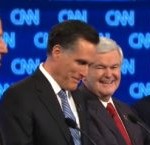Newt Gingrich exaggerates when he says the Environmental Protection Agency has a proposal “that would raise the price of gasoline by 25 cents a gallon.” Gingrich’s cost estimate comes from an oil industry study of “clean gasoline” recommendations made by U.S. automakers. The EPA has yet to issue a proposal, and a top agency official says the oil industry study is based on proposals more stringent than those being considered by the EPA.
In addition, there are competing studies that show the possible EPA rule changes would have far less of an effect at the gasoline pump.
Person: Newt Gingrich
McCain’s Erroneous Earmark Attack
Sen. John McCain incorrectly claimed that earmarks nearly doubled from $7.8 billion to $14.5 billion in Newt Gingrich’s first two years as House speaker. Actually, the increase was about half that.
Furthermore, earmarks first peaked, then declined under Gingrich. By the final year of his speakership, earmarked spending was 20 percent higher than before, not double.
McCain is a longtime opponent of earmarks, which are pet projects added to annual appropriations bills at the request of members of Congress.
The Gingrich Counterattack in Florida
Now comes the counterattack.
After weeks of taking it on the chin in Florida without throwing a punch, the Gingrich side has finally begun to fight back with TV attack ads of its own.
Among the new ads is one from a pro-Gingrich super PAC that takes the personal attacks to a new level, suggesting Romney was associated personally with “illegal activity” in a massive Medicare fraud in the 1990s. The fact is Romney was never accused of wrongdoing in that case.
More Florida Fouls
Newt Gingrich falsely claimed he never favored a federal mandate requiring individuals to have health insurance.
Romney repeated a false accusation that President Obama failed to denounce Hamas rocket attacks in a speech to the United Nations. And Santorum insisted that Muslim terrorists are seeking missile bases in Cuba — a wild claim based most likely on mistranslations of an Italian newspaper report.
These were among the factual fouls that we noted as four GOP presidential candidates met for yet another debate.
Florida Ad War: Mitt Pounds Newt
Gingrich Spanish Radio Ad Pulled
Before we got a chance to write about it, Newt Gingrich yanked a Spanish-language radio ad off the airwaves in Florida. The reason: No, it wasn’t a stellar fact-checking by journalists. Rather, it was Republican Sen. Marco Rubio’s complaint that the ad’s criticism of Mitt Romney was “inaccurate, inflammatory, and doesn’t belong in this campaign.”
Gingrich’s ad had called Romney “the most anti-immigrant candidate,” a claim to which Rubio strenuously objected. He told the Miami Herald: “The truth is that neither of these two men is anti-immigrant.
Disgrace, Influence Peddling and Other Debate Charges
Newt Gingrich complained that in one early burst at the first Florida debate, Mitt Romney said “at least four things that are false” about him. Now Gingrich has specified which claims he was talking about, and we’ve checked the evidence he promised he would — and did — post on his website.
We conclude that two were not false; one was (mostly); and one is a matter of interpretation. In all cases, the claims are in need of further explanation and context.
Factual Flubs in Florida
The four remaining candidates debated once again, this time in Tampa, Florida — where facts took a beating.
Mitt Romney falsely claimed the Navy is smaller now than at any time since the start of World War I. (It had fewer ships as recently as four years ago.) And Newt Gingrich again claimed credit for balancing federal budgets that were voted on after he left the House.
The event was sponsored in part by NBC News,
Did Gingrich ‘Slash’ Federal Spending?
Winning Our Future’s new TV ad falsely claims Newt Gingrich “slashed” spending in his four years as House speaker. Federal spending went up 18 percent from 1995 to 2000, the time frame mentioned in the ad.
In addition, the ad credits Gingrich for “record-breaking surpluses.” There were surpluses for four straight years — from fiscal years 1998 through 2001 — but Gingrich already had left Congress in January 1999. The largest of those surpluses came in fiscal year 2000,









